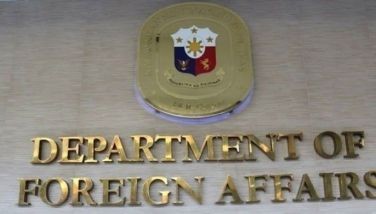Unwanted Filipino, Indonesian migrants overwhelm Borneo
KOTA KINABALU – Migrants from the Philippines and Indonesia who have flooded into Malaysian Borneo are being targeted with a massive deportation program, as the government comes under pressure to act.
The settlers have been blamed for waves of crime and creating a generation of stateless children who live in appalling conditions in the towns and villages of Sabah state.
The influx of mostly Muslim migrants has also tipped the ethnic balance against indigenous tribes who used to dominate the population, say politicians in Sabah, which is struggling to cope with the influx.
After a poor result in March elections that made it more sensitive to voter gripes, the national government has announced a mass crackdown to send the illegal migrants back to their home countries.
“The people there do not recognise the borders. They move in and out due to economic opportunities in Sabah,” Deputy Prime Minister Najib Razak said recently, promising that a “large scale” operation would begin in August.
Sandwiched by the Philippines in the north, and Indonesia’s Kalimantan to the south, resource-rich Sabah has for decades been a magnet for immigrant workers who labor on construction sites and oil palm plantations.
“This problem has a very long history and many observations have been made on illegal immigrants. The people here know this crisis goes back to the 70s,” said cabinet minister Bernard Dompok, who hails from the region.
Dompok, leader of the UPKO party which is part of the Barisan Nasional coalition that has ruled Malaysia for half a century, said Sabahans have becoming increasingly concerned about the number of foreigners.
“I think the focus of those involved in illegal immigration during that time was to ensure there was a change in the demography of Sabah’s population,” he told AFP. “But of course today, in the whole of Sabah, no matter what race or origin or religion, the people are now worried over this perennial problem.”
Sabah’s deputy chief minister Joseph Pairin recently described the problem as “threatening the peace and security in the state” and likened it to a time bomb which could explode if not defused.
Official data say a quarter of the state’s three million inhabitants are “foreigners” but the number of illegals is not known. Pairin said it could be as high as 1.5 million while civil society groups estimate one million.
Najib has said that at least 100,000 to 150,000 people will be deported in the first phase of an ongoing program that will continue until the state is clear of illegal migrants.
In the markets and on the street corners of Sabah’s capital, Kota Kinabalu, migrant children beg for money or try to sell plastic bags to earn a few coins.
Some as young as nine years old can be seen sniffing glue – aid workers say it is a common pastime here – and at night, those who have no homes to go to shelter in cardboard boxes discarded at the market.
“The main problem is they do not have identification and without this, they cannot go to school, so many end up as child labor,” said Aegil Fernandez from rights group Tenaganita.
It conducted a survey that found there are nearly 80,000 stateless children in Sabah, the majority of them of Filipino descent.
“Many of these children fend for themselves. They do not go to school and lay around in markets and restaurants, and some sleep in the market area,” Fernandez said.
The migrant influx to Sabah dates back to the 1970s when tens of thousands of Muslim Filipinos fled conflict in the country’s south and sought refuge here, claiming ties with the Muslim Bajau tribe.
Many of those who stayed have been given permanent residency or citizenship in Malaysia – a fact deeply resented by Sabah’s original inhabitants, many of whom are Christian.
One of the most notorious Filipino settlements is Gaya Island, where some 4,000 illegal settlers live in villages on its fringes.
‘Like criminals’
Meanwhile, the country’s alliance of overseas Filipino groups has urged the Arroyo administration to “intervene diplomatically” for the welfare of undocumented Filipinos being hunted down “like criminals” in Italy in the wake of a new immigration policy imposing longer jail terms on illegal aliens.
The policy has increased by a third the prison sentence for illegal aliens and also prohibits charitable agencies, such as Caritas, from providing any form of help in Italy “even in emergency situations,” Migrante International said in a statement yesterday.
Migrante’s appeal also focused on the welfare of some 30,000 undocumented Filipino workers in South Korea who are allegedly being “flushed out” at the rate of 3,000 per month, as well as of some 500,000 Filipinos being rounded up and deported from Malaysia, particularly from Sabah. – Ding Cervantes
- Latest
- Trending
































